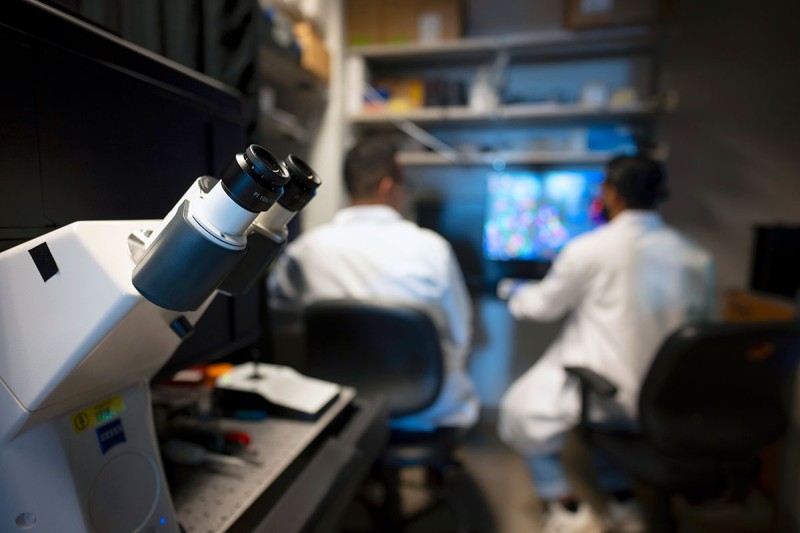
New research from Memorial Sloan Kettering Cancer Center (MSK) finds both acupuncture and massage can benefit those with cancer-related pain; investigates relapse after CAR T cell therapy for multiple-myeloma; and showcases the power of open-source science to develop medicines against COVID-19 and other pandemics.
Both acupuncture and massage can benefit those with cancer-related pain
Research has suggested that acupuncture and massage can help relieve some of the pain felt by people with advanced cancer, but studies have not compared the two modalities to each other. Now a multicenter, randomized clinical trial led by investigators from MSK has found that both treatments not only reduce musculoskeletal pain but also lead to improvements in feelings of fatigue, insomnia, and patients’ quality of life.
The study led by gastrointestinal oncologist Andrew Epstein, MD, and integrative medicine specialist Jun Mao, MD, MSCE, compared the effects of weekly acupuncture and weekly massage for 10 weeks with monthly “booster” sessions for up to 26 weeks. It enrolled nearly 300 patients with advanced cancer whose average worst pain score was 7 on a 10-point scale. Over the study period, acupuncture reduced the worst pain score by an average of 2.5 points; massage reduced the worst pain score an average of 3 points, a difference that was not significant. Many patients also felt better with regard to their fatigue, sleep, and overall quality of life. They also used less pain medication over time. The researchers say efforts should focus on raising awareness about the effectiveness of these approaches, as well as expanding coverage for these treatments. Read more in JAMA Network Open.
Disappearing GPRC5D target leads to multiple myeloma relapse after CAR T cell therapy
MSK multiple myeloma specialist Sham Mailankody, MBBS has led trials showing that CAR T cell therapy targeting an antigen called GPRC5D appears to be safe and effective against the disease. Results published in the New England Journal of Medicine in September 2022 showed that 71% of patients responded to the GPRC5D-directed immunotherapy, meaning their multiple myeloma shrank or disappeared, although some had significant side effects. Among 12 patients who received a lower dose with manageable side effects, the response rate was 58%.
Despite the promising responses, relapses are still common. Dr. Mailankody collaborated with leukemia specialist Omar Abdel Wahab, MD to understand the relapse mechanisms. They studied tumor samples from six relapsed patients to look for clues. In one patient, the team found evidence of biallelic deletion (loss of both copies of the GPRC5D gene) leading to a complete loss of the GPRC5D antigen. In the other five patients, they saw decreased or loss of expression of GPRC5D — although the reason for this was unclear. The finding suggests that genetic alterations may be an important mechanism of antigen escape — a way to evade immune recognition and response — after GPRC5D-directed CAR T-cell therapy. The research was led by first author hematologic oncology fellow Xiaoli Mi, MD.
To overcome antigen escape, Dr. Mailankody is now leading a clinical trial for patients with relapsed or resistant multiple myeloma by using a simultaneous infusion of CAR T cells targeting GPRC5D as well as BCMA, a protein on the surface of the CAR T cells.
“Our goal is to better understand mechanisms of resistance to these therapies and quickly translate these findings guide new, effective treatments for patients,” Dr. Mailankody says.
Read more in the New England Journal of Medicine.
COVID Moonshot project showcases the power of open-science drug discovery
A successful open-science, crowdsourced approach to developing new drugs to fight to COVID-19 pandemic could serve as a model for future pandemics, and for making low-cost antiviral medicines available across the globe, the international research team behind the COVID Moonshot reports.
The team — which included the lab of MSK computational chemist John Chodera, PhD — detailed how they were able to leverage crowdsourcing, machine learning, computer simulations, and high-throughput structural biology and chemistry to search for drugs against the main SARS-CoV-2 protease.
More than 18,000 compound designs, 490 X-ray structures, and 2,000 synthesized molecules for the campaign were shared rapidly and openly, creating a rich, open, and intellectual property-free knowledge base for future anti-coronavirus drug discovery. One drug candidate identified in part with help from COVID Moonshot Consortium data has received emergency approval in Japan. And work continues to develop the COVID Moonshot preclinical candidate, called DNDI-6510, into a potent, oral medication for a new “straight-to-generics” approach — where generics manufacturers would make the drug available at low cost, skipping any high-cost brand name phase.
Despite rapid progress in vaccine development, the COVID-19 will likely become endemic and continue to cause significant deaths,” Dr. Chodera says. “So, not only are these ongoing efforts to develop a COVID-19 antiviral still needed — we believe this model can help to quickly develop affordable drugs against inevitable future viral pandemics.”
In May 2022, COVID Moonshot researchers were given the opportunity to do just this when the NIH awarded MSK a $68 million grant to fund the first three years of the new AI-driven Structure-enabled Antiviral Platform (ASAP), which builds on the Moonshot efforts.
Read more in Science. Learn more about the COVID Moonshot and MSK’s role.